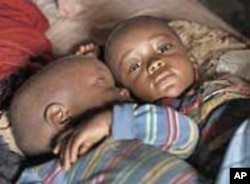Rosamond George was in church in Freetown when the birth pains began and continued into the night. The next day, her husband drove her to a nearby hospital, where it was determined that the baby was lying crosswise in her womb and that she’d need emergency obstetric care. Later her doctor told her that without immediate surgery, she and the baby would have died.
But Rosamond had access to what many pregnant women in the country do not – transportation and skilled birth attendants trained for medical emergencies.
Sierra Leone has some of the highest rates of maternal and child mortality in the world. A joint survey by the United Nations Childrens’ Fund (UNICEF) and the World Health Organization (WHO) found that more than one out of four children die before their fifth birthday. The quality of care available during pregnancy and birth is one of the contributing factors.
<!-- IMAGE -->
Readily available, but not trained for emergencies
Traditional birth attendants (TBAs) are numerous and have been part of maternal care for generations. But they often do not know how to handle difficult births, including those that result in hemorrhaging.
A recent report by Amnesty International, Out of Reach: The Cost of Maternal Health in Sierra Leone, says TBAs may be prominent women in the community, including the village chief’s wife or the first wives in a polygamous family.
Television personality Woteh Camera, who was delivered by a TBA, says they are relevant because most people who live in rural areas don’t have the money to pay for treatment or the ability to reach a clinic.
Although the government recently announced free health care for pregnant and lactating women, clinics may still be far away, and TBAs are inexpensive; they can barter or offer deferred payments.
“Though they are not well trained, I think they are doing a good job, as most people will say, [in view of the fact] that we don’t have qualified people in our rural areas, most especially the remote villages where…the roads are bad and [the clinic or hospital] is far.”
<!-- IMAGE -->
Traditional birth attendant supervisor Mohammed Masere agrees, saying, “At (the) primary healthcare level, TBAs have a role to play because they are closer to the people in the community. They do deliveries, [and deal with patients who] are not able to reach the health facilities on time.”
To update their skills, the Ministry of Health established a three-week training program to teach traditional birth attendants simple prenatal care and basic management of clean and safe deliveries. They also learn how to recognize complications during pregnancy that indicate a woman should be transferred to the nearest medical facility.
Renewed push for skilled birth attendants
But critics say the training period is too short for TBAs to learn current skills for handling difficult pregnancies.
Amnesty International says that even with training, traditional birth attendants do not meet international standards set by the World Health Organization.
Peter Sikana is a reproductive health and emergency obstetric care technical advisor for the UN Population Fund in Freetown. He says he’s seen untrained attendants misus drugs such as Oxytocin and Ergometrine in an effort to expedite labor. This practice can lead to the death of the fetus and may increase the likelihood of a ruptured uterus.
According to Sikana, untrained birth attendants may also fail to understand, or to get women to understand, the seriousness of complications during delivery. Furthermore, he says some TBAs have a financial reason for keeping women at home.
“[They] do not offer to deliver [babies] for nothing. When they recognize problems, they may still want to keep the patient for a longer time [because] when the woman delivers, they will receive a ritual gift [like a chicken]. So you don’t know if the delay was a lack of knowledge or the person wanted to keep the present in case she delivers.”
Sikana says there’s no alternative to training more midwives and nurses. More and more TBAs have been trained in Africa in the last 20 years, he says, but maternal health has not improved much. Making TBA’s the backbone of maternal healthcare service to help deliver babies would be, in his words, “a disaster.”
But others says nurses and midwives can not be trained fast enough to meet the demand, and often TBAs are the only option.
This is part 6 of our 15 part series, A Healthy Start: On the Frontlines of Maternal and Infant Care in Africa











